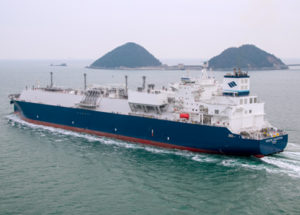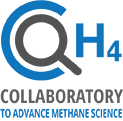First Study to Directly Measure Methane Emissions from LNG Carrier Completed
5/27/21 Des Plaines, IL
Queen Mary University London , with support from the Collaboratory to Advance Methane Science (CAMS) and Enagas SA, successfully conducted a first-of-its-kind study to directly measure methane emissions of an operating liquid natural gas (LNG) vessel. Results from the study will provide critical data-driven insights into the greenhouse gas (GHG) profile of LNG carriers to identify opportunities for environmental performance improvement.
, with support from the Collaboratory to Advance Methane Science (CAMS) and Enagas SA, successfully conducted a first-of-its-kind study to directly measure methane emissions of an operating liquid natural gas (LNG) vessel. Results from the study will provide critical data-driven insights into the greenhouse gas (GHG) profile of LNG carriers to identify opportunities for environmental performance improvement.
Researchers collected comprehensive direct measurements aboard the Cheniere-chartered newbuild GasLog Galveston during a round-trip voyage from Cheniere’s Corpus Christi liquefaction facility to a discharge port in Europe. Data gathered during the voyage included measurements of engine exhaust as well as fugitive emissions. The results of the comprehensive study are expected to be released in a peer-reviewed journal.
“This project comes at a critical time, with policymakers seeking to understand both how to regulate industry and ensure that climate targets are met. Accomplishing this will depend on ensuring transparent, emissions-related data is available and lessons learned from studies such as this are implemented,” said Dr Paul Balcombe, Lecturer in Chemical Engineering and Renewable Energy at Queen Mary University and the lead researcher for the study.
“LNG shipping is an area where Cheniere and fellow CAMS co-founders believe there is potential for real progress on measuring and reducing methane emissions,” said Anatol Feygin, Executive Vice President and Chief Commercial Officer for Cheniere. “This important work is consistent with our commitment to enhance the transparency around the emissions profile of the LNG value chain and robust scientific results are important data points to guide future mitigation strategies.”
Paolo Enoizi, Chief Operating Officer of GasLog Ltd. noted, “We are proud to be a part of the CAMS effort to measure and monitor methane emissions from the GasLog Galveston under real world operating conditions. As responsible shipowners, we view the efforts undertaken by the CAMS as critical to minimizing the environmental footprint of the global LNG shipping fleet and supporting the continued success and competitiveness of the LNG industry.”
“Enagás is intensively working in the detection and quantification of methane within its assets to minimise emissions,” said Claudio Rodríguez, Gas Assets General Manager at Enagás. “We believe improving the accuracy of the emissions data along the gas value chain is critical, and this first-of-its-kind study will shed light on methane emissions associated with the logistic supply chain – informing us of our greatest prospects for development.”
About the Collaboratory to Advance Methane Science
The Collaboratory to Advance Methane Science (CAMS) is a research collaboration on methane science directed by some of the world’s top leaders in energy development and administered by GTI, a leading research, development, and training organization.
CAMS research characterizes methane emissions and identifies specific sources, so mitigation strategies are most effective. Results from CAMS research has the potential to lead to technology solutions, better work practices, and new equipment designs to manage methane emissions.
Demonstrable advancements in the environmental performance of natural gas reinforces industry’s long-term commitment to environmental performance.
CAMS members include Cheniere, Chevron, Equinor, ExxonMobil, Pioneer Natural Resources, Sempra LNG, and Shell. The consortium is administered by GTI, a leading research, development and training organization that has been addressing global energy and environmental challenges by developing technology-based solutions for consumers, industry, and government for 80 years.

